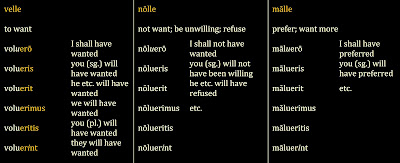[A] Pluperfect tense
Complete the English translations with the phrases listed below:
[i] Aequitāte quam sanguine, causā quam armīs retinēre parta maiōribus mālueram. (Livy) │ It was by just dealing rather than by bloodshed, by having a good cause rather than by arms, that __________ to retain what my ancestors had won.
[ii] Māluerat illam Antiochīam appellārī (Pliny the Elder) │ __________ it to be called Antioch
[iii] … quī fūgēre captā urbe quam sē Rōmānīs trādere māluerant (Livy) │ … __________ to flee after the capture of the city rather than to hand themselves over to the Romans
[iv] "Volueram," inquit, "ut quam plurimum tecum essem” (Cicero) │ "__________," he says, "to be with you as much as possible”
[v] Optumē, istuc voluerāmus. (Plautus) │ Very good, __________ that.
[vi] Nōn modo vōs eritis in ōtiō quī semper esse voluerātis (Cicero) │ You not only will enjoy ease, you __________ for it
[vii] Sed rem immātūram … aperīrī nōluerat (Livy) │ But __________ the matter to be divulged prematurely.
[viii] quī modo nōluerās cōnsulis īre comes (Martial) │ ________ lately to be a comrade of a consul
[ix] … quī coniūrāre et simul capere arma nōluerant (Livy) │ … those _________ to conspire and, at the same time, take up arms
he had not wished; he had preferred; I had preferred; I had wanted [ = I should have liked]; we had wanted; who had always wished; who had preferred; who had refused; you who had refused
[B] Future perfect tense
The future perfect is used to convey an action that, in the speaker’s mind, will have been completed at some point in the future. The future perfect tense of volō, nōlō and mālō are a good example of where the literal translation e.g. “I shall have wanted to reply” or “They will have refused to help” often sounds clumsy and is expressed in a different tense.
Sī voluerō, hoc faciam. │ If I want [literally: if I shall have wanted], I will do this.
Hanc sī audīre volueris, dicet tibi (Seneca the Younger) │ If you wish [literally: if you will have wanted] to hear this (woman) / her, she will tell you
Complete the Latin with the verbs listed below. Where necessary, both a literal and more fluent translation are provided to emphasise the future perfect nature of the action.
[i] You (sg.) will have wanted to do this. │ Tū hoc facere __________.
[ii] If I do not want (to) [literally: if I shall not have wanted], I shall not reply │ Sī __________, nōn respondēbō (Seneca the Younger)
[iii] We will have preferred to stay at home. │ __________ domī manēre.
[iv] I will give my will to be read to whoever wants [ = will have wanted] (it). │ Dabō meum testāmentum legendum cui __________. (Cicero)
[v] They will have preferred peace to war. │ Illī pācem __________ quam bellum.
[vi] They will have been unwilling to take up arms, but it will be necessary. │ __________ arma capere, sed necesse erit.
[vii] If you go [literally: will have gone] to the forum, you will have preferred to give up rest │ Sī ad forum ieris, __________ quiētem relinquere.
[viii] The students will have wanted to listen to the teacher. │ Discipulī magistrum audīre __________.
[ix] You will not have wanted to help me. │ __________ me adiuvāre.
[x] But if I should want [ = I shall have wanted] to do that, it will not be a letter, but a book. │ Quod sī facere __________, nōn erit epistula, sed līber. (Seneca the Younger)
māluerimus; māluerint; mālueris; nōluerint; nōlueris; nōluerō; voluerint; volueris; voluerit; voluerō
____________________
[A]
[i] It was by just dealing rather than by bloodshed, by having a good cause rather than by arms, that I had preferred to retain what my ancestors had won.
[ii] He had preferred it to be called Antioch.
[iii] … who had preferred to flee after the capture of the city rather than to hand themselves over to the Romans
[iv] “I had wanted / I should have liked” he says, "to be with you as much as possible”
[v] Very good, we had wanted that.
[vi] You not only will enjoy ease, you who had always wished for it
[vii] But he had not wished the matter to be divulged prematurely.
[viii] You who had refused lately to be a comrade of a consul
[ix] those who had refused to conspire and, at the same time, take up arms
[B]
[i] Tū hoc facere volueris.
[ii] Sī nōluerō, nōn respondēbō (Seneca)
[iii] Māluerimus domī manēre.
[iv] Dabō meum testāmentum legendum cui voluerit.
[v] Illī pācem māluerint quam bellum.
[vi] Nōluerint arma capere, sed necesse erit.
[vii] Sī ad forum ieris, mālueris quiētem relinquere.
[viii] Discipulī magistrum audīre voluerint.
[ix] Nōlueris me adiuvāre.
[x] Quod sī facere voluerō, nōn erit epistula, sed līber.













